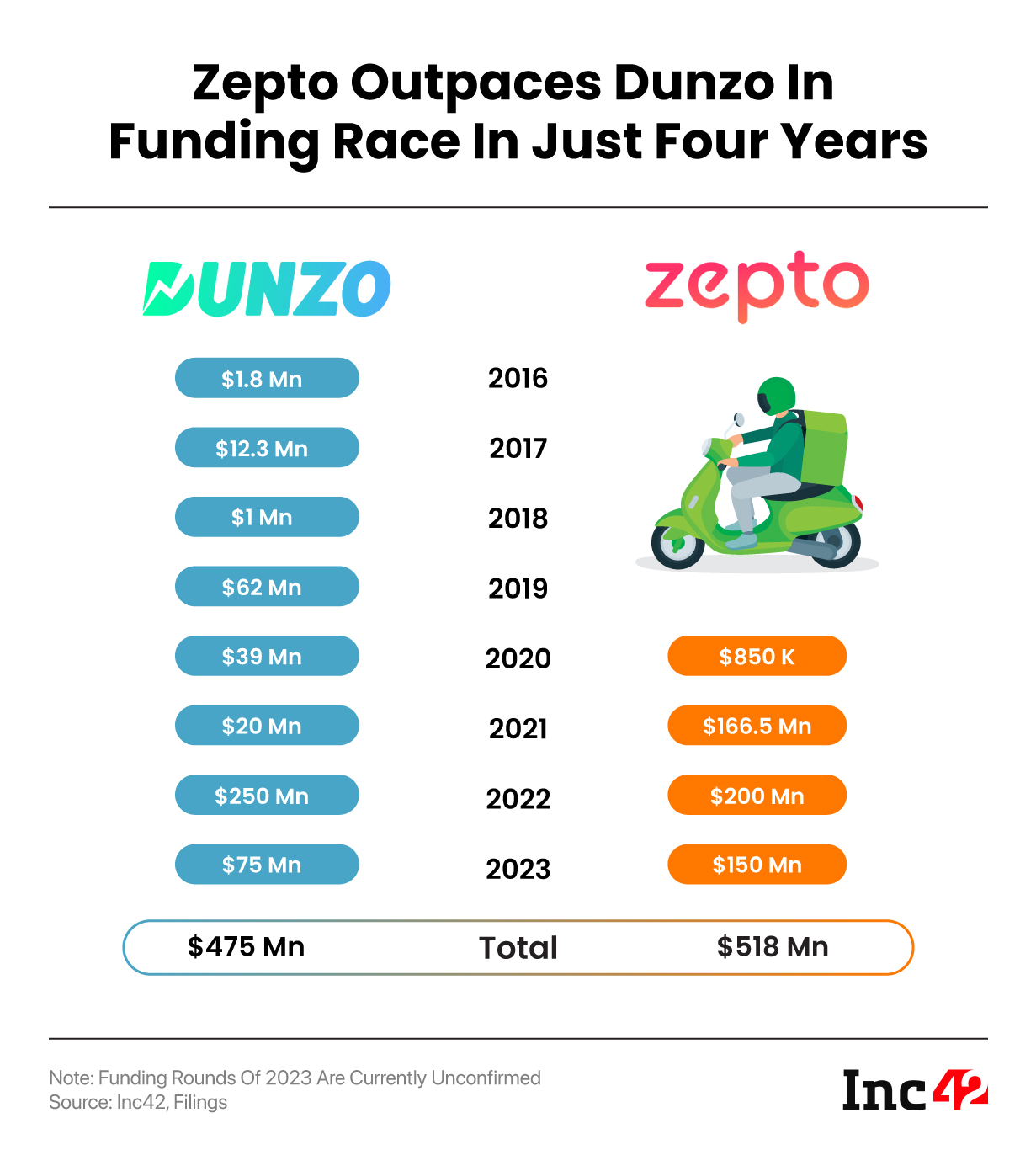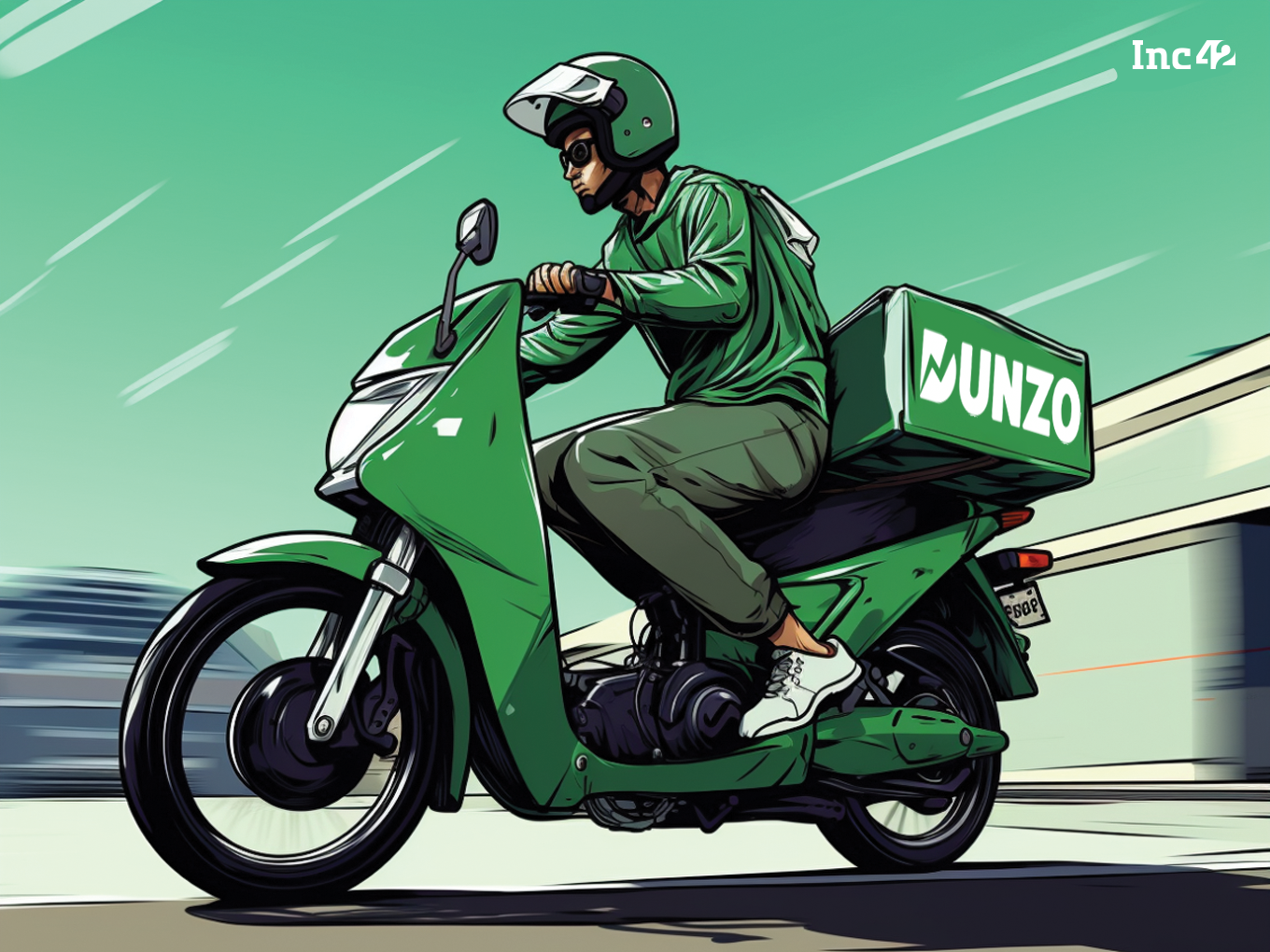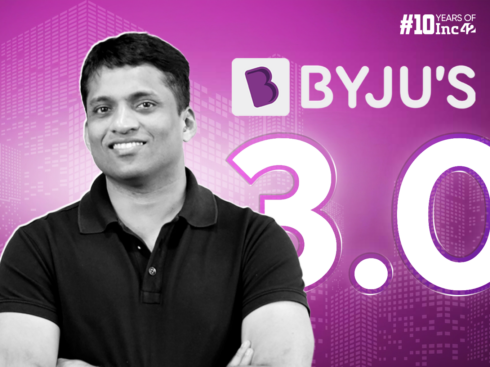SUMMARY
While Dunzo did capitalise to a great extent on the quick commerce wave in the early days, the competition has grown considerably stronger in the past year
Recent reports about the startup delaying manager salaries and largely moving back to the low-burn hyperlocal deliveries model indicates financial uncertainty for Dunzo
Swiggy and Zomato have the scale to unlock success in quick commerce in the long run, while Zepto has the sharp focus that this segment deserves. Dunzo had the ‘It’ factor, but that’s not doing it much good in 2023
There are a few Indian startups that can lay claim to being a verb. In that sense, dunzo
For the so-called Twitterati and early adopters of internet products in India, ‘Dunzo it’ became a common refrain between 2017 and 2020 — whether it was for sending things from one place to another or for ordering things from a nearby store.
Founded in 2015 by Kabeer Biswas, Dalvir Suri, Mukund Jha, and Ankur Aggarwal, Dunzo has been a darling of the Indian startup scene for years.
In many ways, Dunzo has been a lone flag-bearer in the graveyard of hyperlocal startups that mushroomed and promptly shut down between 2015 and 2016. For many years, Dunzo was the last startup standing in this space.
Dunzo outlasted many of these rivals, and by 2018, its model remained unique in the context of Indian startups. The singular nature of its success also meant that when the quick commerce wave began around the end of 2019, with the emergence of the dark store model, Dunzo was well positioned to capitalise.
And it did capitalise to a great extent in the early days of quick commerce, but competition has grown stronger.
For Dunzo, access to capital has become a problem. Recent reports, based on anonymous posts on Grapevine, hint at financial troubles brewing in the company, with managers allegedly getting a flat salary of INR 75K for June 2023 — although the company has promised to release the remaining amount later this month.
We could not get a direct response from the company on the delayed and partial salaries, but sources close to the company claim that Dunzo is going back to what made it a household name among savvy internet users in the first place.
The hyperlocal delivery game is fraught with low margin and unit economic challenges, and when one adds quick commerce expectations to the mix, things get more complicated. While the popular notion was that Reliance’s investment would let Dunzo fuel up for blitzscaling, the opposite has come true.
Dunzo Goes Back To Its Roots
According to sources close to the company, Dunzo is said to be transitioning from a dark store-centric quick commerce business to bringing larger supermarkets and grocery stores on a revenue-sharing basis.
This is the original hyperlocal delivery proposition that Dunzo had created a niche in since 2015 onwards till 2020 before jumping into quick commerce. The retreat is perhaps in line with the cost-effective strategy that the company is adopting in mid-2023.
However, it must be noted that quick commerce through dark stores will be a focus for the company in certain areas where it is guaranteed high demand and better unit economics.
For instance, in April, the startup decided to shut dark stores that were seeing less than 1,000 orders per day, as per sources. Now it’s reevaluating more such dark stores and going back to the hyperlocal play in many cities.
In these cities, the idea is to use the same inventory management tech that has remained a mainstay at Dunzo and turn it to supermarkets for relatively quick deliveries — if not always within 10-15 minutes.
This way, the company would curb the high overheads associated with dark store expansion and focus on tech to match delivery riders with orders from retail stores, and therefore complete orders without the human resource cost of managing a dark store.
The reasoning is sound, but there’s one major headwind for Dunzo in this plan. Grocery and household shopping behaviour in metros and Tier 1 cities has quickly transitioned to quick commerce platforms such as deep-pocketed Swiggy Instamart, Zomato-owned Blinkit and Zepto.
While Mumbai-based Zepto has raised just over $360 Mn since its launch in early 2021, Dunzo has raised over $450 Mn in the past nine years. In fact, as we reported exclusively, Zepto is on the verge of joining the unicorn club and has pulled ahead of Dunzo in terms of fundraising with its latest $150 Mn round.

In comparison, Swiggy and Zomato have raised billions and have a huge revenue base to invest from.
Even as these rivals have scaled up in the quick commerce space, Dunzo had to shut down dark stores late last year.
What primarily went wrong for Dunzo was its mixed focus on hyperlocal deliveries and ‘Dunzo Daily’, the quick commerce offering.
The competition clearly earmarked quick commerce as the growth area, whereas Dunzo continued to hedge its bets and therefore the proposition was not clear to many users.
In 2023, quick commerce has changed its convenience proposition from speed to variety — apps are looking to become the super markets for a new generation of consumers.
Another thing that went wrong: Dunzo was slow to grow is assortment of products.
Besides growing their network, Swiggy, Blinkit and Zepto have also sharpened their focus around particular inventory items that supermarkets typically cater to, and have generally tried to boost the average cart size with new higher-value product assortment.
For instance, the imported sections on Blinkit, Instamart and Zepto carry high-value items that some larger supermarket stores such as Modern Bazaar, Delhi-based Le Marche, Nature’s Basket or Food Hall are well known for. Quick commerce platforms are also tailoring their supply chains for seasonal produce and the likes of Blinkit and Swiggy have also added electronics and other categories to their buckets.
Sources added that today Dunzo does have plans for hyperlocal delivery of electronics from major retailers. But these plans are still in the early stages of development.
The third area that Dunzo dropped the ball on was marketing.
In other words, Dunzo perhaps did not spread its wings wide enough to catch the wind that was blowing on the quick commerce tail (more on this comparison later in the story).
Yes, quick commerce is a marketing-heavy segment and Blinkit and Instamart realised this early on with their promotions blitz. Swiggy and Blinkit also have a higher install base to convert users on to their quick commerce plays and spread promotional costs across multiple verticals.
Zepto banked on its 10-minute delivery pitch to win new-to-quick commerce consumers and also launched ad campaigns to hit the ground running.
Dunzo, which was once the hip kid on the block, finds itself increasingly unfashionable with its return to the ‘old-school’ model, even if some might call it more sustainable.
B2B: Dunzo’s Other Big Hope
Besides the move back to hyperlocal deliveries, Dunzo’s other big focus is on the B2B logistics vertical, where it is counting on ONDC and Reliance for growth and scale.
There’s little doubt that Dunzo’s B2B logistics business has been the biggest beneficiary of Reliance Retail’s mega investment. The startup offers last-mile delivery for Reliance’s Jio Mart ecommerce play.
Besides this, the logistics arm, formally known as Dunzo For Business (D4B), is an empanelled ONDC logistics partner, along with relatively smaller pure-play logistics tech companies, to enable fulfilment services for onboarded sellers.
As we reported last year, ONDC sellers in Bengaluru were concerned about Dunzo leveraging data collected through ONDC fulfilment to boost its parallel dark store-led quick commerce business. But now that this dark store business has been more or less shelved, perhaps sellers might view Dunzo a bit more positively.
ONDC has also expanded beyond Bengaluru and to other locations in recent weeks, which opens up more revenue possibilities for Dunzo. But again, there is some confusion over long-term revenue outlook for logistics on ONDC.
On the logistics and price front, ONDC partners are revisiting their plans, with the network having recently floated its incentive policy for sellers but keeping subsidies intact for buyers.
The incentive programme that is being floated by ONDC provides a subsidy of INR 50 to a consumer on every transaction above INR 100. In addition, ONDC also subsidises consumers with up to INR 40 on every transaction, explaining cheaper or no cost deliveries.
Plus, the likes of Shiprocket, Delhivery, Shadowfax and others have also joined ONDC, which would limit the potential reach of Dunzo’s logistics business.
Essentially, even though B2B hyperlocal logistics seems like the clearest way for the company to break even and reduce operational costs on the commerce front, it is faced with multiple hurdles as of now.
Dunzo: A B2C Brand In A B2B World
A year and a half after its last major fundraise, Dunzo faces the twin challenges of balancing B2C and B2B operations as well as looking for the next capital infusion to grow and scale these up.
That’s a challenge that many startups are dealing with today. As per reports in April 2023, Dunzo’s leadership is bullish about turning profitable by September 2024. That’s still a long way away, and Dunzo’s losses till FY22 meant it would take significant effort to climb out of the red.
Dunzo’s consolidated loss in FY22 widened 2X to INR 464 Cr from INR 229 Cr in FY21 on the back of doubling of its expenses.Meanwhile, its total revenue stood at INR 67.7 Cr in FY22, also registering a 2X rise.
Employee benefit expenses accounted for 26% of the total FY22 expenditure and the layoffs in January and April 2023 would have certainly had a positive impact on this.
Where we can see a clear gap between Dunzo and the competition is in the marketing spend. Dunzo’s advertising promotional expenses in FY22 came up to INR 64.4 Cr or just over 10% of the total expenses of INR 531 Cr. In comparison, Zepto spent a whopping INR 176 Cr in the same fiscal year for marketing or nearly 33% of its total expenses.
As we indicated above, Mumbai-based Zepto has also fuelled up to make a bigger marketing push and scale up its operations.
Despite being around for nearly a decade, Dunzo’s scale and valuation are closer to Zepto than Zomato or Swiggy. However, in terms of the experience of scaling up, Zomato and Swiggy have the upper hand and have also experimented with various models before settling into something resembling a groove.
Swiggy and Zomato are primarily delivery platforms — whether it is food or groceries. Zepto has the sharp focus that this segment perhaps deserves. Dunzo had the ‘It’ factor, but that’s not doing it much good in 2023.
With inputs from Bismah Malik



























